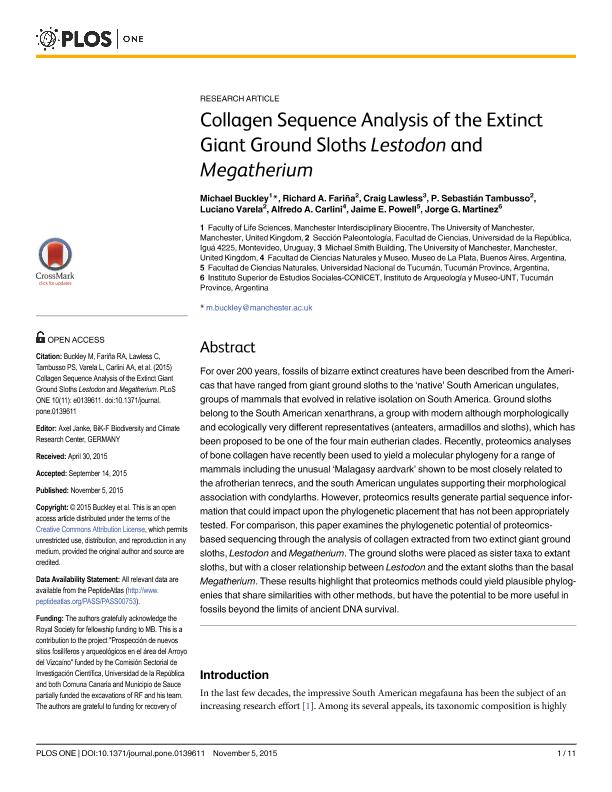Mostrar el registro sencillo del ítem
dc.contributor.author
Buckley, Michael
dc.contributor.author
Fariña, Richard
dc.contributor.author
Lawless, Craig
dc.contributor.author
Tambusso, P. Sebastián
dc.contributor.author
Varela, Luciano
dc.contributor.author
Carlini, Alfredo Armando

dc.contributor.author
Powell, Jaime Eduardo

dc.contributor.author
Martinez, Jorge Gabriel

dc.date.available
2018-07-04T20:31:22Z
dc.date.issued
2015-11
dc.identifier.citation
Buckley, Michael; Fariña, Richard; Lawless, Craig; Tambusso, P. Sebastián; Varela, Luciano; et al.; Collagen sequence analysis of the extinct giant ground sloths lestodon and megatherium; Public Library of Science; Plos One; 10; 11; 11-2015; 1-11
dc.identifier.issn
1932-6203
dc.identifier.uri
http://hdl.handle.net/11336/51264
dc.description.abstract
For over 200 years, fossils of bizarre extinct creatures have been described from the Americas that have ranged from giant ground sloths to the vea South American ungulates, groups of mammals that evolved in relative isolation on South America. Ground sloths belong to the South American xenarthrans, a group with modern although morphologically and ecologically very different representatives (anteaters, armadillos and sloths), which has been proposed to be one of the four main eutherian clades. Recently, proteomics analyses of bone collagen have recently been used to yield a molecular phylogeny for a range of mammals including the unusual 'Malagasy aardvark' shown to be most closely related to the afrotherian tenrecs, and the south American ungulates supporting their morphological association with condylarths. However, proteomics results generate partial sequence information that could impact upon the phylogenetic placement that has not been appropriately tested. For comparison, this paper examines the phylogenetic potential of proteomicsbased sequencing through the analysis of collagen extracted from two extinct giant ground sloths, Lestodon and Megatherium. The ground sloths were placed as sister taxa to extant sloths, but with a closer relationship between Lestodon and the extant sloths than the basal Megatherium. These results highlight that proteomics methods could yield plausible phylogenies that share similarities with other methods, but have the potential to be more useful in fossils beyond the limits of ancient DNA survival.
dc.format
application/pdf
dc.language.iso
eng
dc.publisher
Public Library of Science

dc.rights
info:eu-repo/semantics/openAccess
dc.rights.uri
https://creativecommons.org/licenses/by-nc-sa/2.5/ar/
dc.subject
Colágeno
dc.subject
Proteómica
dc.subject
Megafauna Pleistocénica
dc.subject
Antofagasta de La Sierra
dc.subject.classification
Otras Ciencias Biológicas

dc.subject.classification
Ciencias Biológicas

dc.subject.classification
CIENCIAS NATURALES Y EXACTAS

dc.title
Collagen sequence analysis of the extinct giant ground sloths lestodon and megatherium
dc.type
info:eu-repo/semantics/article
dc.type
info:ar-repo/semantics/artículo
dc.type
info:eu-repo/semantics/publishedVersion
dc.date.updated
2018-06-29T13:04:18Z
dc.journal.volume
10
dc.journal.number
11
dc.journal.pagination
1-11
dc.journal.pais
Estados Unidos

dc.journal.ciudad
San Francisco
dc.description.fil
Fil: Buckley, Michael. The University of Manchester; Reino Unido
dc.description.fil
Fil: Fariña, Richard. Universidad de la República; Uruguay
dc.description.fil
Fil: Lawless, Craig. The University of Manchester; Reino Unido
dc.description.fil
Fil: Tambusso, P. Sebastián. Universidad de la República; Uruguay
dc.description.fil
Fil: Varela, Luciano. Universidad de la República; Uruguay
dc.description.fil
Fil: Carlini, Alfredo Armando. Universidad Nacional de La Plata. Facultad de Ciencias Naturales y Museo; Argentina. Consejo Nacional de Investigaciones Científicas y Técnicas; Argentina
dc.description.fil
Fil: Powell, Jaime Eduardo. Universidad Nacional de Tucumán. Facultad de Ciencias Naturales e Instituto Miguel Lillo; Argentina. Consejo Nacional de Investigaciones Científicas y Técnicas; Argentina
dc.description.fil
Fil: Martinez, Jorge Gabriel. Consejo Nacional de Investigaciones Científicas y Técnicas. Centro Científico Tecnológico Conicet - Tucumán. Instituto Superior de Estudios Sociales. Universidad Nacional de Tucumán. Instituto Superior de Estudios Sociales; Argentina
dc.journal.title
Plos One

dc.relation.alternativeid
info:eu-repo/semantics/altIdentifier/url/http://journals.plos.org/plosone/article?id=10.1371/journal.pone.0139611
dc.relation.alternativeid
info:eu-repo/semantics/altIdentifier/doi/http://dx.doi.org/10.1371/journal.pone.0139611
Archivos asociados
